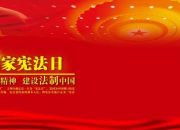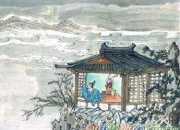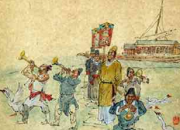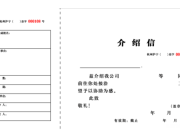你希望未来成为什么的人的ted演讲稿
时间:2021-08-31你希望未来成为什么的人的ted演讲稿
ted演讲是世界范围内影响力很大的非营利性质的演说平台,如果你还没有关注过,就跟着小编来看看这篇文章吧,下面是为你提供的ted演讲稿:你希望未来成为什么的人,欢迎阅读。想了解更多英语演讲稿,请继续关注本栏目。
【ted演讲稿:你希望未来成为什么的人】
Raise your hand if you've ever been asked the question "What do you want to be when yougrow up?"
Now if you had to guess, how old would you say you were when you were first asked thisquestion?You can just hold up fingers. Three. Five. Three. Five. Five. OK. Now, raise yourhand if the question"What do you want to be when you grow up?" has ever caused you anyanxiety.
Any anxiety at all.
I'm someone who's never been able to answer the question "What do you want to be when yougrow up?"
See, the problem wasn't that I didn't have any interests -- it's that I had too many. In high school,I liked English and math and art and I built websites and I played guitar in a punk band calledFrustrated Telephone Operator. Maybe you've heard of us.
This continued after high school, and at a certain point, I began to notice this pattern inmyself where I would become interested in an area and I would dive in, become all-consumed, and I'd get to be pretty good at whatever it was, and then I would hit this point whereI'd start to get bored. And usually I would try and persist anyway, because I had already devotedso much time and energy and sometimes money into this field. But eventually this sense ofboredom, this feeling of, like, yeah, I got this, this isn't challenging anymore -- it would get to betoo much. And I would have to let it go.
But then I would become interested in something else, something totally unrelated, and I woulddive into that, and become all-consumed, and I'd be like, "Yes! I found my thing," and then Iwould hit this point again where I'd start to get bored. And eventually, I would let it go. But then Iwould discover something new and totally different, and I would dive into that.
This pattern caused me a lot of anxiety, for two reasons. The first was that I wasn't sure how Iwas going to turn any of this into a career. I thought that I would eventually have to pick onething, deny all of my other passions, and just resign myself to being bored. The other reason itcaused me so much anxiety was a little bit more personal. I worried that there was somethingwrong with this, and something wrong with me for being unable to stick with anything. I worriedthat I was afraid of commitment, or that I was scattered, or that I was self-sabotaging, afraid ofmy own success.
If you can relate to my story and to these feelings, I'd like you to ask yourself a question that Iwish I had asked myself back then. Ask yourself where you learned to assign the meaning ofwrong or abnormal to doing many things. I'll tell you where you learned it: you learned it fromthe culture.
We are first asked the question "What do you want to be when you grow up?" when we're aboutfive years old. And the truth is that no one really cares what you say when you're that age.
It's considered an innocuous question, posed to little kids to elicit cute replies, like, "I want to bean astronaut," or "I want to be a ballerina," or "I want to be a pirate." Insert Halloween costumehere.
But this question gets asked of us again and again as we get older in various forms -- forinstance, high school students might get asked what major they're going to pick in college. Andat some point, "What do you want to be when you grow up?" goes from being the cute exerciseit once was to the thing that keeps us up at night. Why?
See, while this question inspires kids to dream about what they could be, it does not inspirethem to dream about all that they could be. In fact, it does just the opposite, because whensomeone asks you what you want to be, you can't reply with 20 different things, though well-meaning adults will likely chuckle and be like, "Oh, how cute, but you can't be a violin maker anda psychologist. You have to choose."
This is Dr. Bob Childs --
and he's a luthier and psychotherapist. And this is Amy Ng, a magazine editor turned illustrator,entrepreneur, teacher and creative director. But most kids don't hear about people like this. Allthey hear is that they're going to have to choose. But it's more than that. The notion of thenarrowly focused life is highly romanticized in our culture. It's this idea of destiny or the one truecalling, the idea that we each have one great thing we are meant to do during our time on thisearth, and you need to figure out what that thing is and devote your life to it.
But what if you're someone who isn't wired this way? What if there are a lot of different subjectsthat you're curious about, and many different things you want to do? Well, there is no room forsomeone like you in this framework. And so you might feel alone. You might feel like you don'thave a purpose. And you might feel like there's something wrong with you. There's nothingwrong with you. What you are is a multipotentialite.
A multipotentialite is someone with many interests and creative pursuits. It's a mouthful to say. Itmight help if you break it up into three parts: multi, potential, and ite. You can also use one ofthe other terms that connote the same idea, such as polymath, the Renaissanceperson. Actually, during the Renaissance period, it was considered the ideal to be well-versedin multiple disciplines. Barbara Sher refers to us as "scanners." Use whichever term you like, orinvent your own. I have to say I find it sort of fitting that as a community, we cannot agree on asingle identity.
It's easy to see your multipotentiality as a limitation or an affliction that you need toovercome. But what I've learned through speaking with people and writing about these ideas onmy website, is that there are some tremendous strengths to being this way. Here arethree multipotentialite super powers.
One: idea synthesis. That is, combining two or more fields and creating something new at theintersection. Sha Hwang and Rachel Binx drew from their shared interests in cartography, datavisualization, travel, mathematics and design, when they founded Meshu. Meshu is a companythat creates custom geographically-inspired jewelry. Sha and Rachel came up with this uniqueidea not despite, but because of their eclectic mix of skills and experiences. Innovation happensat the intersections. That's where the new ideas come from. And multipotentialites, with all oftheir backgrounds, are able to access a lot of these points of intersection.











